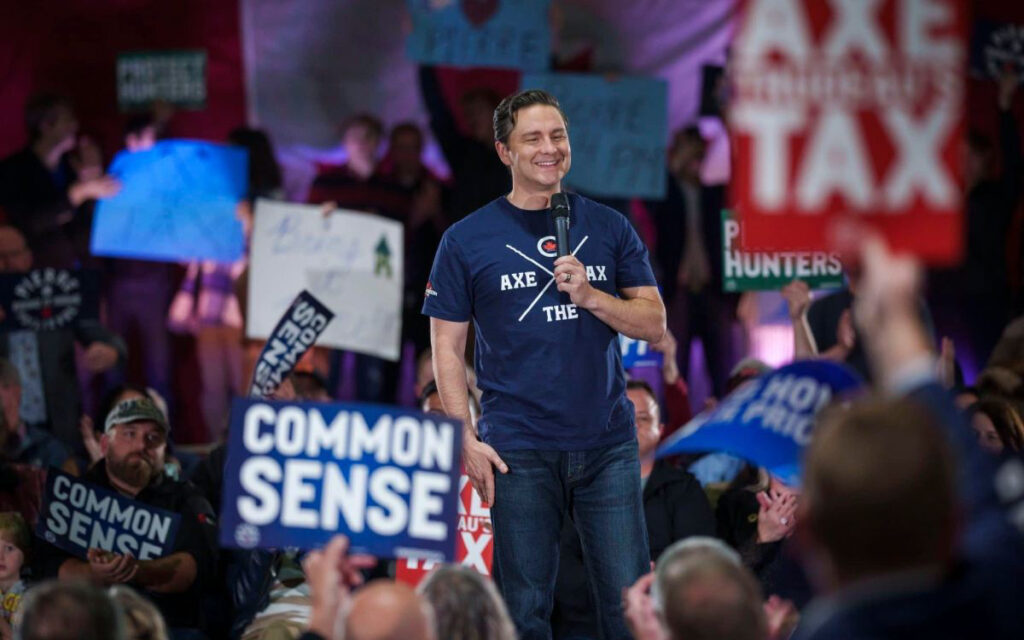
To the Conservatives’ credit, they aren’t looking for validation from the armchair quarterbacks in Ottawa. It’s a numbers game at this point, a fact that Poilievre and his team understand well. One need only follow his tracks to know exactly where and how he plans to pick up seats in the next election. As for what the policy will inevitably like, that too is a known commodity. Photo Credit: Pierre Poilievre/X.
One of the criticisms leveled at Conservative Leader Pierre Poilievre time and again is that he isn’t showing his hand on policy. Left-leaning pundits allude to a hidden agenda. More centric commentators make the case that when you are flying this high in the polls, why change course?
While there is some truth to the latter argument, the reality is Poilievre has been clear about the vision he is selling to Canadians. And his message has been consistent.
For anyone who has watched Poilievre’s ascension from opposition pitbull to pragmatic front-runner, he has put forward the clear, foundational building blocks of how the federal government will serve Canadians under a Conservative led government.
Don’t take my word for it, though. Poilievre opened the doors to his caucus session earlier this week and invited media to listen in.
His message? “Let me be very clear and let me say it again and again. Conservatives will fight throughout this session to axe the (carbon) tax, build homes, fix the budget, stop the crime.”
That was on Sunday. Since then, Poilievre has traveled from the suburbs of Toronto to the Vancouver coast and made two substantial policy announcements to complement the thematic caucus statement.
The first came on the hotly contested auto theft file. According to the federal government, an estimated 90,000 cars are stolen on an annual basis in Canada, costing around $1 billion to Canadians.
Following the Liberal caucus retreat earlier this month, the Trudeau government staked out territory on the issue in the form of a national auto summit. The gathering of law enforcement and stakeholders from across the auto value chain took place yesterday, under the guise of coming up with solutions to help curb the export of stolen vehicles. Federal dollars were also announced to help the Canadian Border Security Agency (CBSA) tighten up security at ports.
Poilievre has taken a different tack, choosing instead to call for the fat to be trimmed from the consulting and management budget at CBSA and for funds to be reallocated for the purchase of X-ray scanners.
These announcements certainly fit under stopping the crime and fixing the budget.
Moving to the west coast, Poilievre revealed details on a commitment to put forward a policy on resource revenue sharing for First Nations. Developed in part through consultation, it is the first substantive piece of policy geared towards economic reconciliation and ensuring that First Nations are included in all aspects of the economy without barrier to entry.
Notably, the two announcements this week were made in parts of the country where the Conservatives need to pick up seats in the next election.
To the Conservatives’ credit, they aren’t looking for validation from the armchair quarterbacks in Ottawa. It’s a numbers game at this point, a fact that Poilievre and his team understand well. One need only follow his tracks to know exactly where and how he plans to pick up seats in the next election. As for what the policy will inevitably like, that too is a known commodity.

Josie Sabatino is a Senior Consultant at Summa Strategies, focused on providing strategic insight and helping clients meet their objectives in an ever changing and complex political and regulatory environment. Prior to joining Summa, Josie spent nearly a decade in political communications and most recently served as the Director of Communications to the Hon. Erin O’Toole, former Leader of the Official Opposition.




















